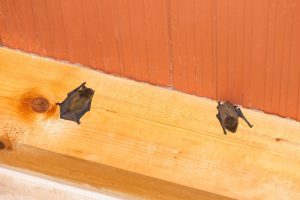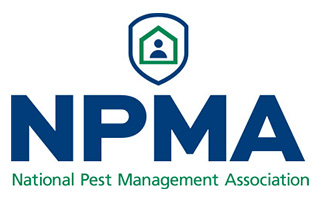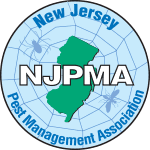BAT CONTROL AND BAT-PROOFING

Bats are nocturnal, flying animals that are known for inhabiting dark and secluded locations. These creatures spend most of their time searching for insects, preferably mosquitoes. As they dip and dive at fast speeds, bats can eat their weight in bugs every night. Bats are actually very beneficial to the environment and are not innately attracted to humans; they are nature’s pest control, helping reduce active mosquito populations.
There are over 1,400 species of bats across the world, but only two dominate the New Jersey area: the little brown bat and the big brown bat. Even if you don’t see bats, they are very prevalent throughout New Jersey.
Not sure if you have bats at home? Or maybe you want to learn more about how to bat control works. Check out the following information to clarify some questions you may have.
Library Shortcuts
- Do bats bite?
- Should I be concerned about bats?
- What may bats in your property cause?
- How to identify a bat infestation?
- Are bats protected?
- Can I get rid of bats myself?
Do bats bite?
Bats, in fact, will only bite if they feel threatened or if they are handled improperly. It is a common misconception that bats will attack humans for no reason, a myth that has been proven inaccurate. If you or someone you know has been bitten by a bat, it is important to seek medical care immediately to test for rabies transmission. Be sure to wash the bite and any other locations that have come in contact with the bat’s saliva. Unfortunately, it is impossible to tell if the bats have rabies solely based on appearance, so testing must be conducted. If transferred, rabies is a deadly disease that causes inflammation of the brain and sometimes death. However, bats are rarely rabid, with only less than 10 percent documented of becoming rabid.
Should I be concerned about bats?
Even though, bats do not bite unless they feel threatened and rabies is not very common in these creatures, homeowners should be concerned about bats being present in their properties. Bats nesting in your property become hazardous due to the droppings and urine they consistently create. The fungi that harbor in bat droppings can cause a lung disease known as histoplasmosis.
What may bats in your property cause?
Bats typically colonize in large groups, and one bat can produce between 20-30 droppings a day; so the number of droppings in a home can easily pile up which can cause roofs to cave in, causing damage to your property. Besides the damage and the health threat that bats may cause, their waste also attracts other pests like cockroaches, and the smell of their feces may encourage other bats to invade the home. There is also the possibility of them dying inside your walls, ceiling, etc. which will spread a bad smell in your home. A dead bat and the accumulation of droppings should be professionally decontaminated and removed.

How to identify a bat infestation?
As mentioned before bats are nocturnal creatures, they are also very quiet animals. Bats, like other wildlife, look for a place that offers protection and a comfortable temperature where they can live and thrive. Unfortunately, your home satisfies both requirements, they often use dark areas like attics, wall voids, chimneys, and barns as their nesting areas. They usually use small cracks or gaps in a mortar joint on higher buildings to enter a structure.
Homeowners don’t always notice gaps in their properties and can go several years without knowing that bats are nesting because they become so secluded; therefore, confirming the presence of bats will take a little investigating. The following are some signs of bat infestations that could help you identify an infestation:
- If you often find bats flying inside your home this means that you probably have bats living somewhere in your walls or attic
- Piles of droppings in one corner of the attic or near the entry point
- Droppings on attic insulation
- Stains on the attic walls from bats’ urine
- Your attic has a strong smell of ammonia, which is caused by the excrement
- Hearing small squeaking noises or scratching
- Seeing them leaving your property through the possible main entry point
Are bats protected?
Bats are protected in New Jersey. The following was stated by the NJ Division of Fish and Wildlife:
“All bats – like all of NJ’s native nongame wildlife – are protected by law under the NJ Endangered and Nongame Species Conservation Act of 1973, making it illegal to harm, harass, capture, or kill bats, or to attempt to do so.
Bat colony exclusion must be done following proper methods and seasonal “safe dates” so that bats are not harmed in the process. Physically removing bats or poisoning bats is NOT legal and NOT effective. Flytraps and glue traps should NOT be used in places where bats may encounter them.
New Jersey’s “safe dates” for bat exclusion are April 1-30 and August 1-October 15.”
For more information about safe dates for bat exclusions please click here.

Can I get rid of bats myself?
You will find different ways to get rid of bats on your own online; you’ll find a lot of DIY tactics and methods that involve “natural” remedies or ultrasonic sound waves. Unfortunately, there is no research behind these claims. Bats will continue to be drawn in year after year until the entries are sealed. If you have bats in your attic or chimney, call a wildlife removal or pest control company to handle the situation professionally.
Signs You May Have a Bat Problem
One of the most obvious signs of a bat infestation is the presence of bat guano. Guano can leave stubborn stains on vinyl siding, wood, brick, and other surfaces. Additional signs include:
- A strong ammonia-like odor
- Actually seeing a bat, especially indoors
- Unusual noises, such as squeaking or fluttering
- Greasy rub marks near entry points
If you’re inspecting an attic or other enclosed space where bats may be present, it’s essential to wear a respirator to avoid inhaling harmful spores from guano.
Why Do Bats Enter Homes?
Bats enter homes in search of safe, undisturbed places:
-
In summer, females look for secure roosts to give birth to their pups.
-
In winter, bats seek out warm, humid areas to hibernate.
Common entry points include:
-
Gaps along the roofline (eaves, soffits, fascia boards)
-
Vents, including attic, gable, roof, and sometimes dryer or exhaust vents
-
Chimneys
Where Do Bats Like to Roost?
Bats prefer dark, warm, and humid spaces that are typically unoccupied. Common roosting spots include:
-
Attics
-
Walls
-
Chimneys
-
Roofs
It is not normal for bats to be found in living areas.
Common Problems Caused by Bats
Health Risks
-
Bat guano can harbor a fungus that causes histoplasmosis, a potentially serious respiratory disease.
-
Bats can also carry rabies, a deadly virus transmitted through bites or scratches.
Property Damage
-
Guano and urine can accumulate in walls, attics, and other areas, causing strong odors, stains, and damage to insulation, wood, and other materials.
-
Their presence can also attract secondary pests, such as insects.
Unpleasant Odors and Noises
-
Large colonies produce significant waste, resulting in persistent odors.
-
You may also hear squeaking, scratching, or fluttering—especially at night.
How We Remove Bats
1. Inspection & Identification
We locate all roosts, entry points, and signs of activity.
2. Humane Bat Removal
Our specialists wear protective gloves and follow all wildlife regulations to ensure safe removal and release of bats.
3. Exclusion & Prevention
We seal all potential entry points to prevent bats from returning.
Why DIY Bat Repellents Don’t Work
Attempting to remove bats yourself is dangerous and often ineffective. You risk being bitten or scratched—and potentially exposed to diseases like rabies.
Most DIY or store-bought repellents fail for several reasons:
-
Bats adapt to sounds or scents
-
Scent-based deterrents fade quickly and need constant reapplication
-
Home remedies rarely address the root of the problem
The only reliable long-term solution is professional exclusion and cleanup.
Want a Free Estimate?
Need to Schedule Service?
Have a Questions?
WHAT WILL WE DO?
Our bat control and bat proofing process typically consists of the following stages:
- Confirm or discard the existence of bats in your home through an inspection
- Identify the factors that may be causing and contributing to the infestation
- Evacuate the existing bats in the property and proof it to prevent future infestations
To learn more about our Exclusion Service, click here.
What our clients are saying
Our Partners and Awards
Service Areas
New Jersey:
Ocean County
Essex County
Passaic County
Morris County
Hudson County
Bergen County









